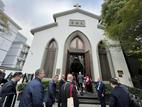"I used to only read about church disunity and division in the Bible, but it was not until I experienced it myself that I realized how powerful and damaging church splits can be and how difficult they are to heal," lamented a church co-worker who personally went through a division. His congregation was torn apart by differing views on ministry between older and younger leaders. As a result, the church's witness and the spread of the gospel in the local community were impacted, and the revival that had been building up was lost. Since the split, both congregations have also struggled to welcome new members.
This is far from a single case. Such examples have been seen in the early church, throughout over two thousand years of church history, and even today. Scripture contains abundant teaching on unity from Jesus Christ and his apostles. They urged disciples disputing over who was greatest to practice humility and admonished the divided church in Corinth to "be no divisions among you, but that you be perfectly united in mind and thought."
Indeed, wherever there are people, there will be conflicts. As a spiritual community made up of individuals from diverse backgrounds and with different gifts, it is natural for the church to encounter disagreements, tensions, and disputes in the course of ministry and faith. The key lies in how to handle and address conflicts and differences.
Church A, a township congregation in coastal East China, chose not to remain idle during the pandemic but instead committed itself to developing small groups. Today, nearly half of its 200 members are actively involved in these groups. The ministry has brought vitality to the church, as believers have begun reading the Bible, deepening their commitment to the church. Group members have grown steadily, and new leaders continue to be established.
Regarding this transformation, Elder C stressed that "unity must always take precedence over the launch of any new ministry." He explained that in advancing church work, leaders must learn the discipline of "stopping," whether to pursue unity among co-workers and believers or to face challenges in small group development.
In advancing ministry, a leader must first have a vision and then ensure that the vision is shared by full-time and core co-workers. Having pastored the church for over a decade, he believes that unity among co-workers is more important than ministry expansion.
In his view, ministry is not about determining who is right or wrong, nor about winners and losers. Perspectives can change over time. An idea that proves effective in a period may later become an obstacle to church growth. Such progress requires leaders to remain humble, set aside personal preferences, and seek the Holy Spirit's guidance.
"At work, we often focus too much on results while neglecting our relationship with the Lord," Elder C emphasized. "In truth, work only has value when it is grounded in the right relationship." He believes that from God's perspective, so-called "failure" or "success" is not a measure of personal worth, but rather of humility and whether one serves on the basis of true faith. He reminded himself not to exalt the Lord's name and zealously pursue transformation, only to have the Lord say He does not know him. "When you are in a true relationship with the Lord, you will know how to handle disagreements," he added.
Brother P, the head of a city church in Eastern China, believes that in promoting church reform and carrying out ministry, it is essential to first seek the recognition and unity of co-workers and then work together, as this is what pleases God.
Brother P has served in the church for over 20 years and assumed leadership last year. Following this, he initiated reforms, including the establishment of small groups and the systematization of his sermons. Initially, his approach met with some misunderstanding. He begins by praying to discern whether his efforts align with God's will. Once confirmed, he shares his ideas with co-workers and seeks their approval, avoiding any pressure to frame it as God's will. "I tell everyone that this is what I hope to do, then you reflect, share your own ideas, and pray. Once there is agreement, we move forward together. That is the right way," he said.
Brother P also reflected on his own experiences as a church co-worker, acknowledging moments of dissatisfaction with leaders or colleagues. During those times, he prayed for guidance and received the insight, "Because there is no right." He uses this experience to remind co-workers not to assume they are always correct. "Learning to obey in a flawed environment and under imperfect leadership is also part of training," he said.
(Church A, Elder C, and Brother P are pseudonyms for safety reasons.)
Originally published by the Gospel Times
- Edited by Karen Luo and translated by Poppy Chan












